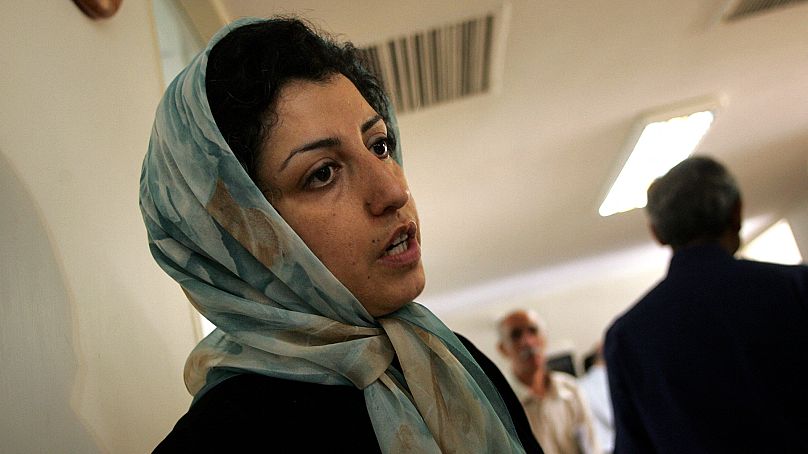Iranian Nobel Peace Prize laureate Narges Mohammadi started a hunger strike on Monday after being denied medical care in prison.
Nobel Peace Prize laureate Narges Mohammadi began a hunger strike on Monday after she and other inmates were blocked from getting medical care and to protest the country’s mandatory headscarves for women, a campaign advocating for the activist said.
The decision by Mohammadi increases pressure on Iran’s theocracy over her incarceration, a month after being awarded the Nobel Prize for her years of activism despite a decades long campaign by the government targeting her.
Meanwhile, another incarcerated activist, the lawyer Nasrin Sotoudeh, reportedly needs medical care she has yet to receive. She was arrested while attending a funeral for a teenage girl who died under disputed circumstances in Tehran’s Metro while not wearing a hijab.
The Free Narges Mohammadi campaign said she sent a message from Evin Prison and “informed her family that she started a hunger strike several hours ago.” It said Mohammadi and her lawyer for weeks have sought her transfer to a specialist hospital for heart and lung care.
It did not elaborate on what conditions Mohammadi suffered from, though it described her as receiving an echocardiogram of her heart.
“Narges went on a hunger strike today ... protesting two things: The Islamic Republic’s policy of delaying and neglecting medical care for sick inmates, resulting in the loss of the health and lives of individuals. The policy of ‘death’ or ‘mandatory hijab’ for Iranian women,” the statement read.
It added that the Islamic Republic “is responsible for anything that happens to our beloved Narges.”
Iranian officials and its state-controlled television network did not immediately acknowledge Mohammadi’s hunger strike, which is common with cases involving activists there. Iran’s mission to the United Nations did not immediately respond to a request for comment.
While women hold jobs, academic positions and even government appointments, their lives are tightly controlled. Women are required by law to wear a headscarf, or hijab, to cover their hair. Iran and neighbouring Afghanistan remain the only countries to mandate that. Since Amini’s death, however, more women are choosing not to wear it despite an increasing campaign by authorities targeting them and businesses serving them.
Mohammadi has kept up her activism despite numerous arrests by Iranian authorities and spending years behind bars. She has remained a leading light for nationwide, women-led protests sparked by the death last year of a 22-year-old woman in police custody that has grown into one of the most intense challenges to Iran’s theocratic government.
The woman, Mahsa Amini, had been detained for allegedly not wearing her headscarf to the liking of authorities. In October, teenager Armita Geravand suffered a head injury while in the Tehran Metro without a hijab. Geravand’s parents appeared in state media footage saying a blood pressure issue, a fall or perhaps both contributed to their daughter’s injury. Activists abroad have alleged Geravand may have been pushed or attacked for not wearing the hijab. She died weeks later.
Authorities arrested Sotoudeh, a 60-year-old human rights lawyer, while she attended Geravand’s funeral. PEN America, which advocates for free speech worldwide, said last week that “50 police and security personnel charged at the peaceful group, beating some and dragging others across gravestones as they were arrested.”
Sotoudeh was not wearing a hijab at the time of her arrest, PEN America said and suffered head injuries that have led to prolonged headaches.
“Her arrest was already an outrage, but there is no world in which violence against a writer and human rights advocate can be justified,” PEN America CEO Suzanne Nossel said in a statement.












